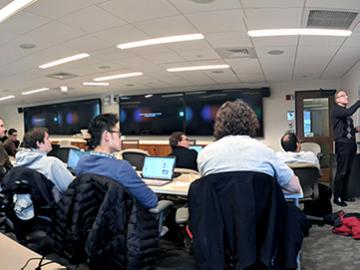
There was no sugarcoating the day’s topics.
What can data science tell us about the intelligence of Ashkenazi Jews? Can bioinformatics give us insights into how prehistoric human migrations have influenced genetic diseases today? What can data mining reveal about health disparities among different ethnicities?
More importantly, can these data—and their interpretation—be trusted?
Topics at the intersection of race and science may trigger controversial conversations, but for third-year Harvard Medical School students enrolled in HMS's innovative new course on computationally-enabled medicine, these were necessary, if delicate, discussions.
“My hope for today is to show you that if you don’t have a certain mental hygiene about data science and computation, you can come to a lot of erroneous conclusions about the significance of race and ethnicity that can directly affect patient health,” course co-director Isaac Kohane, the Marion V. Nelson Professor of Biomedical Informatics, told the class.